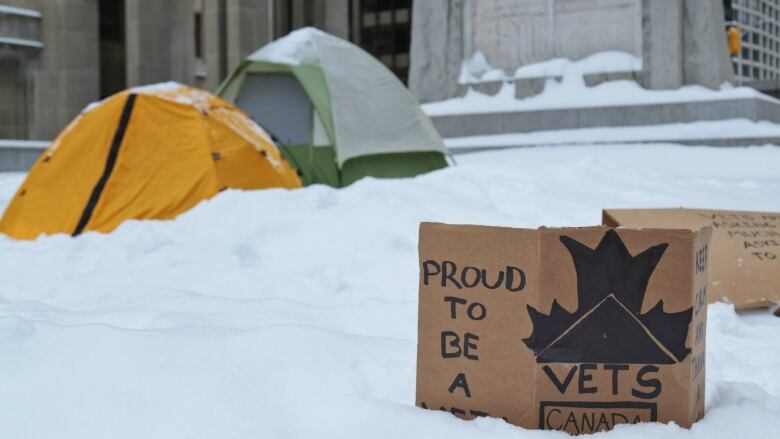Governments of the past have been able to provide proper veteran care. So what's changed?
Are veterans asking too much? Well, let's look at what past Canadian governments have been able to scrounge up

Earlier this month, Prime Minister Justin Trudeau answered three generations of Canadian Forces veterans whowondered why they have received far less than veterans who came before them: "Because they are asking for more than we are able to give right now," Trudeau told an Edmonton town hall.
The prime minister is wrong, obviously: the government could give more, if it wanted to. But Trudeau can nevertheless be congratulated for finally admitting that the government's aim is ultimately to minimize its liability to care for all veterans, but particularly those with disabilities and their families. One-time cash infusions, such as the government's forthcoming $622 million bailout of the military's chronically underfunded disability pension plan, shouldn't distract us from that fact.
Veterans need to understand the fact that this government (just like its Conservative predecessor)is in effect bargainingbattling on a multitude of fronts (legal, political, media, academia, and stakeholder manipulation) in an effort to lessen its financial obligation to those in uniform. And veterans need to wake up and face this reality if they stand to make any gains.
-
Some veterans want more than Ottawa can afford, Trudeau tells town hall
-
'The system is broken': Watchdog rips into endless grind of studies on veterans issues
So, are veterans asking too much? Well, let's look at what governments of the past have been able to scrounge up.
For at least the last 200 years, whenever veterans required care, government provided, sometimes begrudgingly, regardless of its economic circumstances. The first pension plan for disabled Canadian veterans and their survivors was passed by the government of Upper Canada in 1816 and 1817.
Upper Canada took the brunt of the U.S invasions and, at the end of the war, large sections of the province (including its capital York)had been devastated by fighting. Farms had been burned and the economy was in tatters. Added to this was the fact that 1816 was also an abnormally cold and rainy year, which ruinedmuch of the crop.
But these severe economic circumstances did not prevent Upper Canada from putting in place an easily accessible pension scheme for those who served during the war and their surviving family members.
Pension paperwork
Compared to the bureaucratic labyrinth and delays that veterans have to navigate through today, the amount of paperwork required to receive a pension in 1816-17 was laughably but effectively scant. A one-page declaration from the soldier's commanding officer was sufficient testimony to a soldier's disability. (Today, Veterans Affairs demands a separate medical opinion than the one provided by military doctors, who are undoubtedly the most qualified to attribute an injury to a soldier's time in uniform.)
One century later, Canada was in the midst of a post-war recession with a massive cohort of newly released servicemen who needed help. The government at the time passed the Pension Act, which set in place the means and the financing to grant military pensions to all disabled veterans. The same year, veterans benefits represented more than 21 per cent of total government spending.
Other rehabilitation programs at the time included vocational training, clothing allowances, interest-free loans, health and dental care, as well as preference for veterans in civil service appointments. Dedicated veterans hospitals and rehabilitation centres were established, making veterans' care the precursor of Canada's highly regarded universal health care system.
Fiscal commitment was not smooth by any means, but Canada remained financially devoted to its veterans throughout the 1921 depression, as well as the Great Depression of the 1930s. In fact, economic hardship forced government to care for struggling and destitute veterans through the creation of the War Veterans Allowance, a financial safety net provided in addition to the Pension Act that compensated for pain, sufferingand incapacity. At the height of the Great Depression, veterans' benefits reached 18 per cent of the federal budget.
The original "Veterans Charter" emerging from World War II was truly universal. Every veteran was offered assistance to re-establish life back at home, with programs offering farming equipment and animals, land, homes, education, financial assistance and priority job placements. By 1947, veterans benefits were twice the expenditures of national defence and 16 per cent of the federal budget. Canada invested 2.3 per cent of its entire GDP inassisting veterans. This investment in veterans, both economists and historians largely agree, contributed to Canada being one of the most successful post-war economies.
Current spending
Since then, appreciation for Canadian veterans has markedly declined. We seem to have very little regard for what it means to wear a military uniform, to defend the freedoms and rights most Canadians take for granted while risking life, limb and soul for a government that treats sacrifice with condescending platitudes. Current spending on veterans represents a mere 1.2 per cent of the federal budget and 0.2 per cent of GDP. Is this really "more than we are able to give right now?"
Trudeau's answer to veterans' questions about pension gaps unfortunately reflects the shift in modern government philosophy (shared by all parties) that younger veterans, regardless of disability or sacrifice, simply do not have the same value to the nation as previous generations. That in mind, perhaps we should assess how much we can afford in caring for our veterans before we ask them put on a uniform and send them off to war.
This column is part ofCBC'sOpinion section.For more information about this section, please read thiseditor'sblogandourFAQ.













_(720p).jpg)


 OFFICIAL HD MUSIC VIDEO.jpg)
.jpg)



























































































